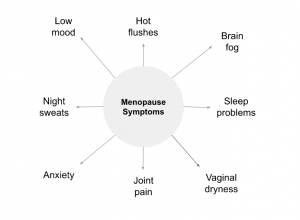Menopause
By Louisa Hockley
What is menopause?
Menopause happens when a woman has not had a period for a year (50+) or two years (45-50). Perimenopause is the onset stage of menopause where women begin to experience symptoms but still get periods.
Why is it important to talk about?
The subject of menopause has been pushed to the side for too long but it finally appears to be coming into mainstream media without being labelled a taboo. It’s important to open the conversation and educate ourselves on this natural transition that every woman will eventually experience, as well as to bust previous myths and misconceptions.
Symptoms
Various symptoms may occur due to fluctuating hormones. Oestrogen and progesterone drop post menopause and symptoms tend to reduce.

Staying active
Exercise can help metabolism, mood and confidence. It keeps our bones strong. But… ensure a proper warm up and cool down is done. As we get older our bones and more vulnerable, so it is vital that our bodies are prepared before working out. The drop in oestrogen can lead to an impaired pelvic floor with issues including leaking, incontinence and vaginal dryness. Exercise can help prevent bladder problems. Continue those pelvic floor exercises to strengthen the pelvis and prevent these issues.
Mental health
Look after your mental health – feel good! For over 30 years a woman’s brain has had a consistent supply of oestrogen to aid its daily decision making, functioning and emotional balance. So when this constant supply suddenly ceases it is no wonder women are faced with mental health challenges including anxiety and depression.
Treatment
Hormone treatment:
1. HRT – Hormone replacement therapy works by replacing hormones such as oestrogen that are lost during menopause. HRT comes in the form of patches, implants and pills. This treatment helps to reduce most menopause symptoms but it also comes with risks so it is important to consult your GP before deciding.
2. Oestrogen – combats vaginal dryness and discomfort during menopause. This treatment can be inserted vaginally, taken as a pill, cream or ring.
3. Testosterone gel – helps to improve mood, energy levels and sex drive. This treatment can only be prescribed after menopause by a specialist doctor.
Non-hormone medicines:
4. CBT – cognitive behavioural therapy is an option to target mood changes and increased anxiety.
5. There are two types of medicine called Clonidine and Gabapentin that can be used to treat hot flushes and night sweats.
**If you are considering any treatment options, then please consult your doctor/GP first to find a treatment that is safe and effective.

About the author
I am a Level 3 qualified Personal Trainer at Halo Gym and have an MSc in Sports Performance and a BSc in Sports Science. I have a keen interest in female health and take a holistic approach to women in sport, from the general public to elite female athletes. My goal is to educate and empower women, and to help them make gains in and outside of the gym.






